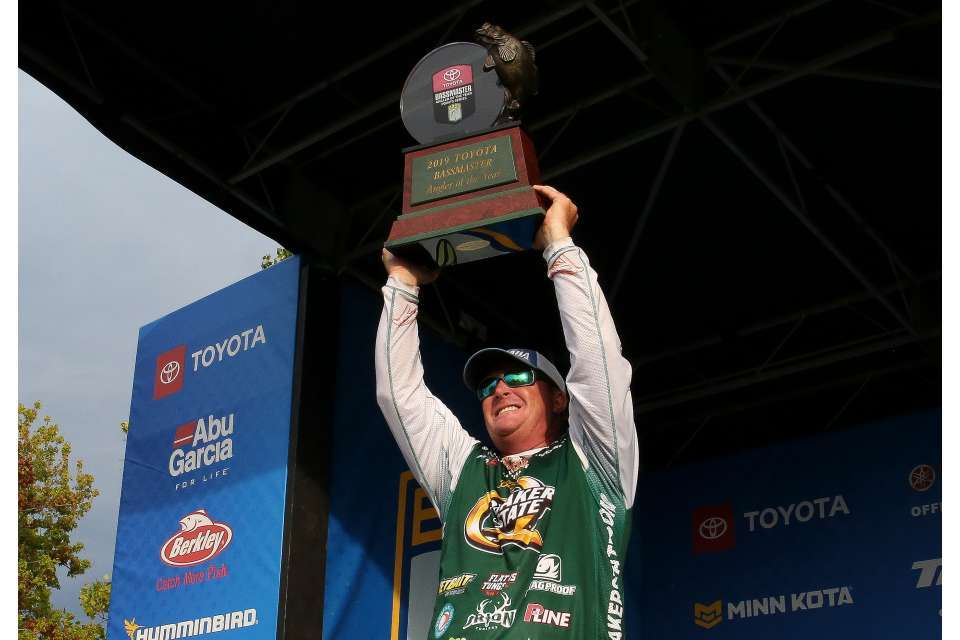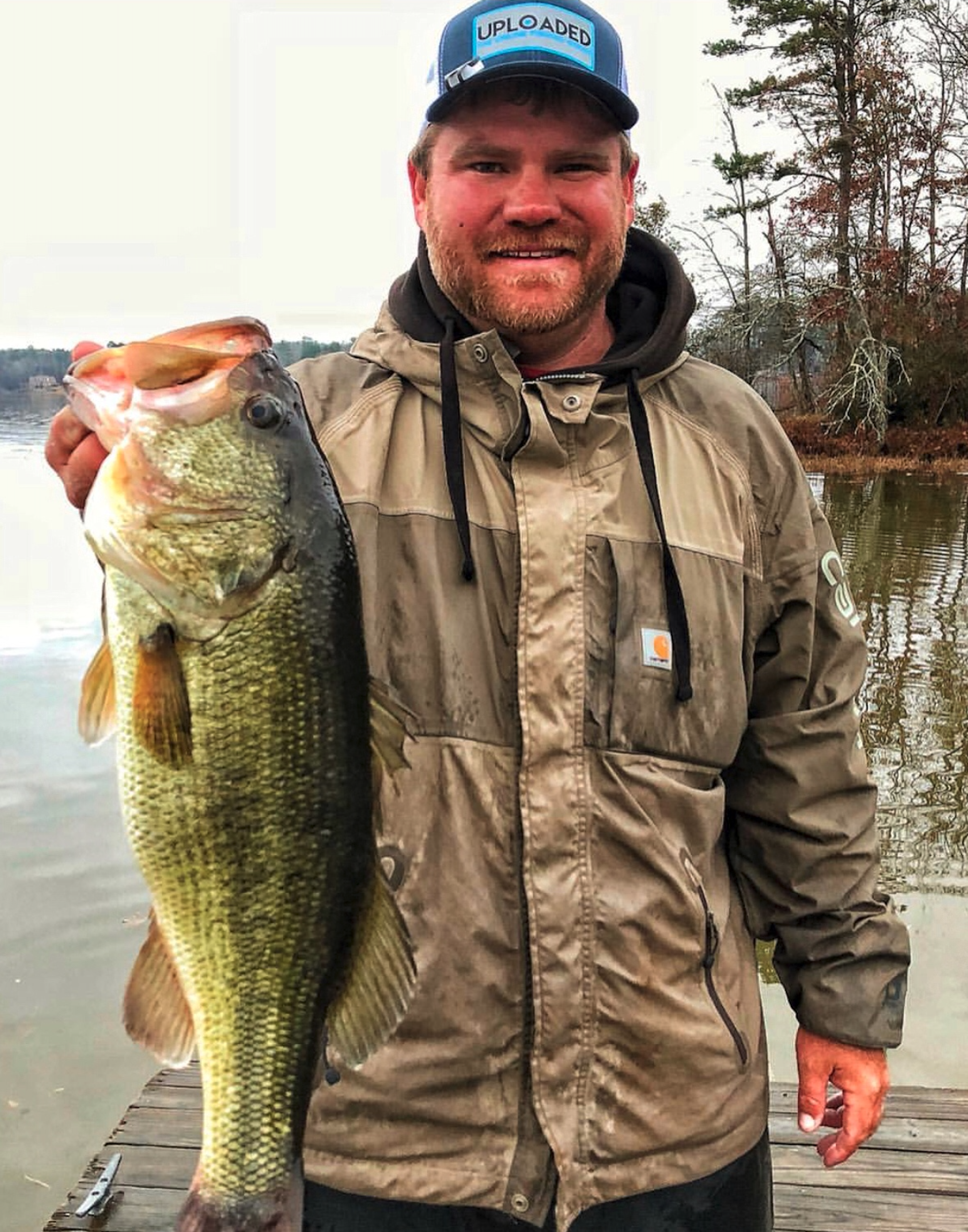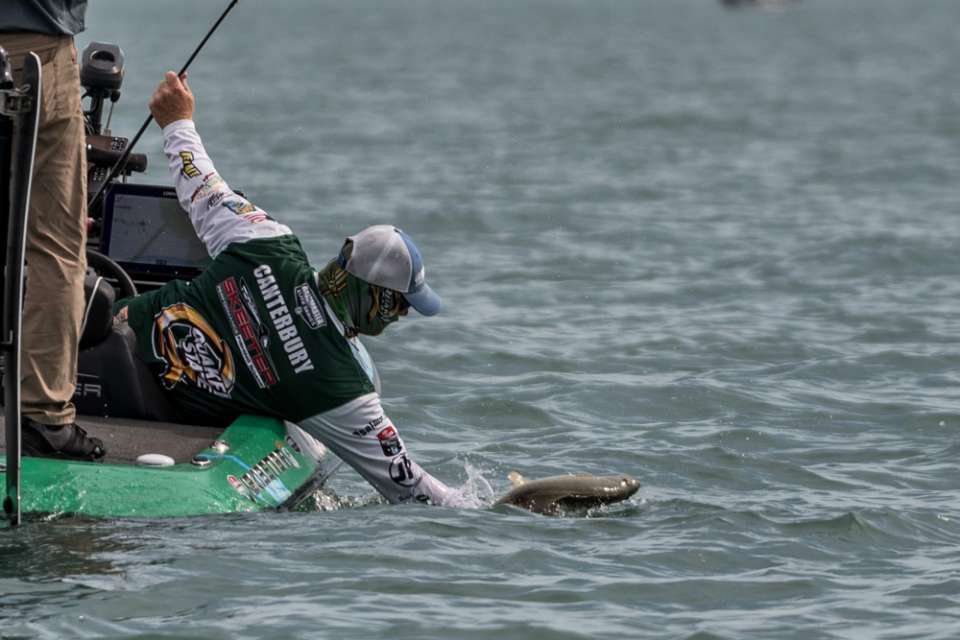
This is the final installment in a five-part series retracing the steps that led Elite Series pro Scott Canterbury to his first Bassmaster Angler of the Year title in 2019. We pick back up at the ninth stop of the season.
Lake Tenkiller
The ninth stop on the Elite Series had originally been scheduled for Fort Gibson Lake, a fishery Canterbury had been looking forward to.
“The water was high and in the bushes,” he said. “I was going to be able to fish my strengths, something I was greatly looking forward to.”
But the water became too high and the flooding forced B.A.S.S. to relocate to nearby Tenkiller just prior to the event — a lake where Canterbury had no history to draw from.
“What little I knew was that there were big smallmouth in it, so I figured it was going to be an offshore deal.”
As Canterbury sampled the offshore bite, his long-time travel companion and fellow Elite Series angler Jay Yelas put together a pretty solid pattern shallow.
“Jay had a really good day flipping bushes. I ended up getting a few bites in the bushes, and I had a really good second day of practice in the bushes. I found two stretches of bushes that had about 3 1/2 feet of water on them, but the water was falling 6 inches a day. Then the night before the tournament it fell a foot.”
Worried about the falling water, he mixed it up in practice and kept searching for an offshore bite. The 16-inch length limit on largemouth was another motivator for Canterbury to find a deep bite. There was a similar 16-inch limit on smallmouth, but the 12-inch limit on spotted bass meant Canterbury could perhaps fill his limit out with spots if the need should arise.
“I finally found three offshore places. And when I caught one off-shore, it was a keeper. But I just didn’t commit to do it all day because I had some good bites in the bushes. And I thought I could catch them.”
While many of the other anglers were flipping the bushes, he was catching his fish skipping his signature series Canterbury Pro Buzz under the bushes.
“I thought it was going to be really good.” He said. “The first day of the tournament, I went out as boat No. 1. I went right to where I wanted to start, and I start catching them right away. I caught eight bass on a buzzbait in the bushes in the first hour, six of them were between 15 1/2 and 16 inches, of course. I only caught one that measured 16 inches. Some of those non-keepers were 2 1/2-pounders. They were good fish.”
Frustrated, he moved to some steeper banks and caught a small limit of spots. Then he fished through two of his offshore spots without a bite.
“I pull up on the last offshore place with about 30 minutes to go in the day, and I caught a 3-pound smallmouth and 1 1/2-pound spot on a Carolina rig. And I never throw a Carolina rig.”
After Day 1, Canterbury was fairly satisfied, but Chris Zaldain had taken the lead for AOY. Canterbury was right on his heels.
“On Day 2, I started out fishing bushes,” he said. “I caught them again just like on the first day, caught seven good fish, but not one of them measured 16 inches. I probably threw back an 11-pound limit or so and didn’t have a fish in the boat. I went back to fishing the steeper stuff for spots, and I did that for a long time and finally caught four keepers that wouldn’t have weighed 5 pounds.”
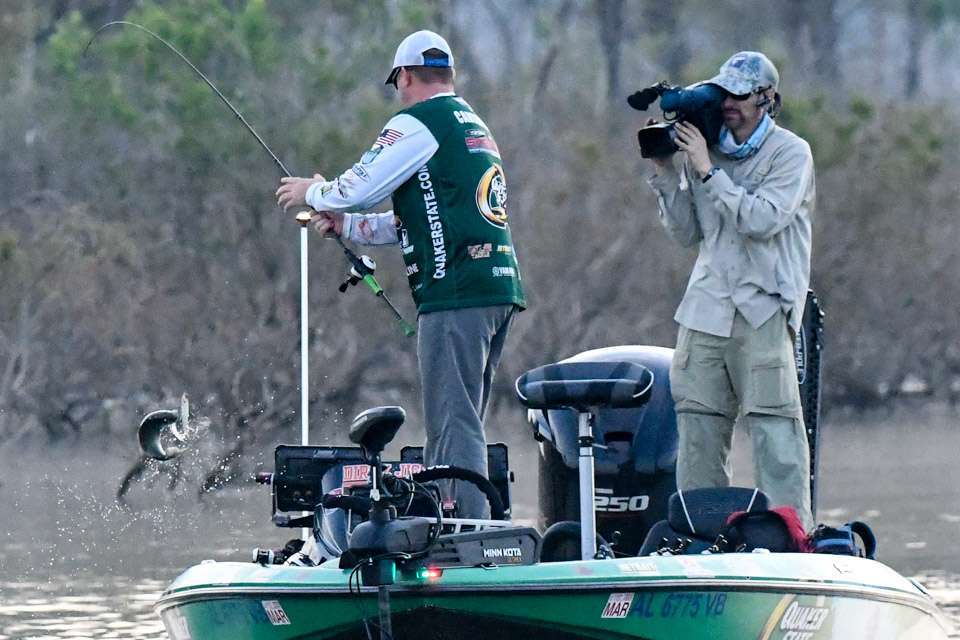
With only an hour left in the day, it was decision-making time for Canterbury. He decided to run to where he had caught his best two bass on Day 1, but before running there he would stop on one of his other offshore spots, make four or five casts and then move on. He had fished it twice on Day 1 without a bite, but something was telling him to give it one more shot.
“At this point I had those voices in the back of my head telling me AOY was gone. I’ve been in that position before and just choked. But this time it was different. My first cast on that spot I caught a 1 1/2-pound spot, which was my biggest fish at that time and my fifth keeper. The next cast I caught a 3-pound largemouth.”
The flurry continued. In 30 minutes at that location, Canterbury culled all four of the fish he had in his boat.
“That 30 minutes won AOY for me,” he said. “I pulled up planning to make four or five casts and ended up catching every fish from that spot that I weighed in that day.”
“That was the moment where I just felt like I was going to win AOY. I was at such peace the whole second half of the year. Everyone kept talking about the pressure, but I just went fishing. But at that time, when I caught those Tenkiller fish like that, that’s when I thought to myself, this is my year.”
That final stop on Day 2 was enough to move Canterbury into the Day 3 cut, where he went out and caught his biggest bag of the tournament and moved up even farther.
“That gut decision on Day 2 saved what I had worked for all year. At Cayuga I had caught 20 pounds in 20 minutes, but this was catching like 9 pounds in 20 minutes, and it was the best 20 minutes I had all year.”
AOY Championship on St. Clair
Surviving Tenkiller where he had no history, Canterbury was beyond excited to wrap the year up on St. Clair where he had a lot of history. Though there were still several challenges lying ahead.
The wind being one such challenge. Strong 20 to 30 mph winds were pushing 6-foot waves across the fishery. Anglers were getting seasick as they tried to battle the elements.
“Half the guys wouldn’t even go out,” he said. “But I was leading AOY. And I couldn’t move up anymore, all I could do was lose it. So, I practiced daylight until dark all three days. I fished everything I could.”
In attempt to avoid some of the heavier winds, Canterbury and his travel companion and fellow Elite Series Angler Matt Arey opted to head south.
“He had a couple waypoints on some rock veins where he had caught them before. The second fish I caught down there was a 5-pounder. We caught several between us, and thought we could both go there and catch 17-pounds.
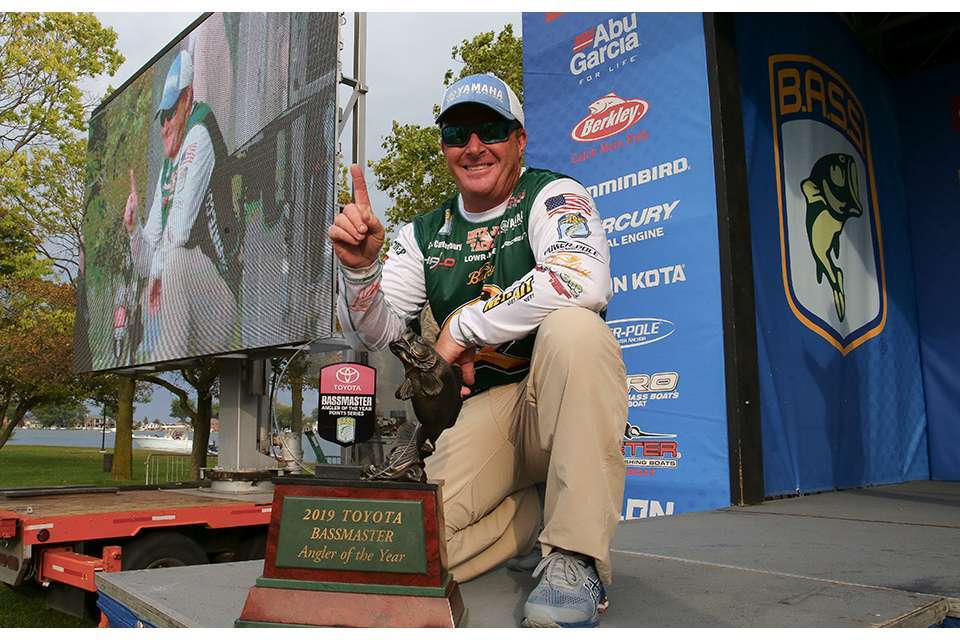
“The next day we fished the north shore because of the wind direction, and we caught some fish up there. It was pretty decent. The numbers weren’t like they have been in the past up there, but when we got a bite it would be a good one. Arey caught seven or eight but never caught one under 3 1/2 pounds. I caught seven or eight and all of mine were 3 1/2-plus pounds, too.”
Going into the tournament, he had a solid plan, and backup plan. But as is usually the case in fishing, the best laid plans are still susceptible to a chaotic curveball at any point.
“I had been beating my stuff up pretty bad through three days of practice. Ten minutes after I started the tournament, both of my front graphs went out. It was literally the biggest tournament of my career, I hadn’t had an issue all year and both of them suddenly shut off.”
In disbelief, Canterbury scrambled around and found the back graphs were still operational. So again, it was decision-making time. Should he run in and get the graphs fixed in the service yard? Or try to walk back and forth from the front deck to see what he was fishing on the back graphs?
“We were in 3-footers, at least,” he said. “The guys that went to the south shore had 6-footers. So, I knew with the wind direction I couldn’t go to where we caught them on the first day of practice.
“I could have gone in to the service yard and got it fixed. But I didn’t know how long it would have taken them to fix it. It would have taken me an hour and half to run back in and then turn around again. But if it took an hour to fix it, I’d have lost 2 1/2 hours of fishing.”
Canterbury decided to put his head down and grind. He fished relatively blind, and stumbled to the back of the boat occasionally to make sure he was at least in the general vicinity of his waypoints. A bold decision, but it paid off.
“At about 11:30, I had only caught three keepers casting a tube and a dropshot. I reached down and picked up a crankbait. I threw it straight off the right side of the boat, got it halfway back to the boat and there he was, a 4-pounder.
“The wind was blowing me quickly, so by the time I put the fish in the livewell and got back on the front deck, I wasn’t in the same spot anymore,” he said. “I threw it as far as I could off the left side of the boat this time. I reeled it down and another one got it. Back to back casts in completely opposite directions, and I caught a 4-pounder and a 3 1/2-pounder. That saved me on Day 1. I only caught six fish that day, all day long. But I had around 18 pounds, which was enough to keep my hopes alive.”
He started Day 2 in the same area, but with all his graph issues resolved. By lunch he probably had another 18 pounds. But the wind had finally calmed down, and the fish on the south end that he and Arey had found early in practice were calling his name.
“I decided to run down south and I culled three fish down there, and ended up with 22 pounds.”
The AOY Championship is only a three-day event. At that point there was one day of competition left. The whole season has come to a head. Canterbury was in a good position but needed one more solid day.
“I started right back in the same place up north with Matt again, and I caught two right away — a 3 1/2-pounder right off the bat, and then I catch a 2 1/2-pounder, which is like not even catching one up there. I had two fish at 11 o’clock, and I decided to run back down south.”
He made a couple stops on the way and finally arrived at 12:30. He caught a few small fish quickly and filled out his limit, but the big ones weren’t there.
“I moved out deeper on that same rock vein, about 30 yards, and caught a 3 3/4-pounder. I hit Spot Lock on my trolling motor and from 12:45 p.m. to 1:20 p.m. I caught one or missed one between 3 1/2 pounds and 4 pounds on every cast I made.”
By Canterbury’s calculations he had about 19 pounds. Going into the day he figured if he caught 17 pounds he would have a really good chance of winning AOY, no matter what the other top contenders caught. Mathematically, they could only move up so far due to the lead Canterbury built heading into this event. Again, it was his to lose. But he wasn’t done yet.
“I figured if I caught 20 pounds I would have it won. I still could have gotten beat, but a lot of people would’ve had to catch them really good and pushed me down the leaderboard for the tournament.”
While crunching numbers inside his head, he continued to fish. After missing four fish in a row on the tube that he had been catching all his fish on, he put it down and picked up a drop shot.
“I threw out there and caught a 4 1/4-pounder on my first cast,” he said. “That was the biggest fish I had and it put me right at 20 pounds. It was such a relief. I fished for another hour just as freely as you could ever imagine.
“I haven’t told this part to many people, but I’ll tell it now. I had a 20-mile run back across the lake to weigh-in. I ran back at 50 miles per hour, just taking my time. And I had tears coming out from behind my sunglasses the whole time. It wasn’t because I knew that I had won, but I knew I had done everything that I could do, and it wasn’t in my hands anymore.”
Though the results were out of his hands, they were quickly reoccupied with a heavy piece of hardware. Everything Canterbury could do was in fact enough to earn him the title that most top-shelf pros agree means even more than the Bassmaster Classic.
“I want one of those blue trophies and a Classic trophy before my career is done. But I got the hardest one out of the way first. That’s one way to look at it,” he said. “I never really thought about it until we were on the way home. I had the AOY trophy buckled into the backseat and my wife Dixie was reading some stuff about the tournament and she read an article that said, ‘Scott Canterbury’s name has been added to the Elite Series AOY list and is only the 24th name to ever appear on that trophy.’ That’s pretty cool.”
Scott Canterbury did what only two dozen anglers in the history of the sport have ever done. He reached the pinnacle. Earned the title of best-of-the-best. Navigated a treacherous road avoiding pitfall after pitfall, always keeping his cool, never letting the obstacles lead him astray.
Decisions are extremely important in this sport. But having the confidence to make them not knowing the outcome is everything. Canterbury remained confident in the face of adversity, and his decisions reigned supreme.
Follow Canterbury’s full season:
Part 1
Part 2
Part 3
Part 4
Part 5
